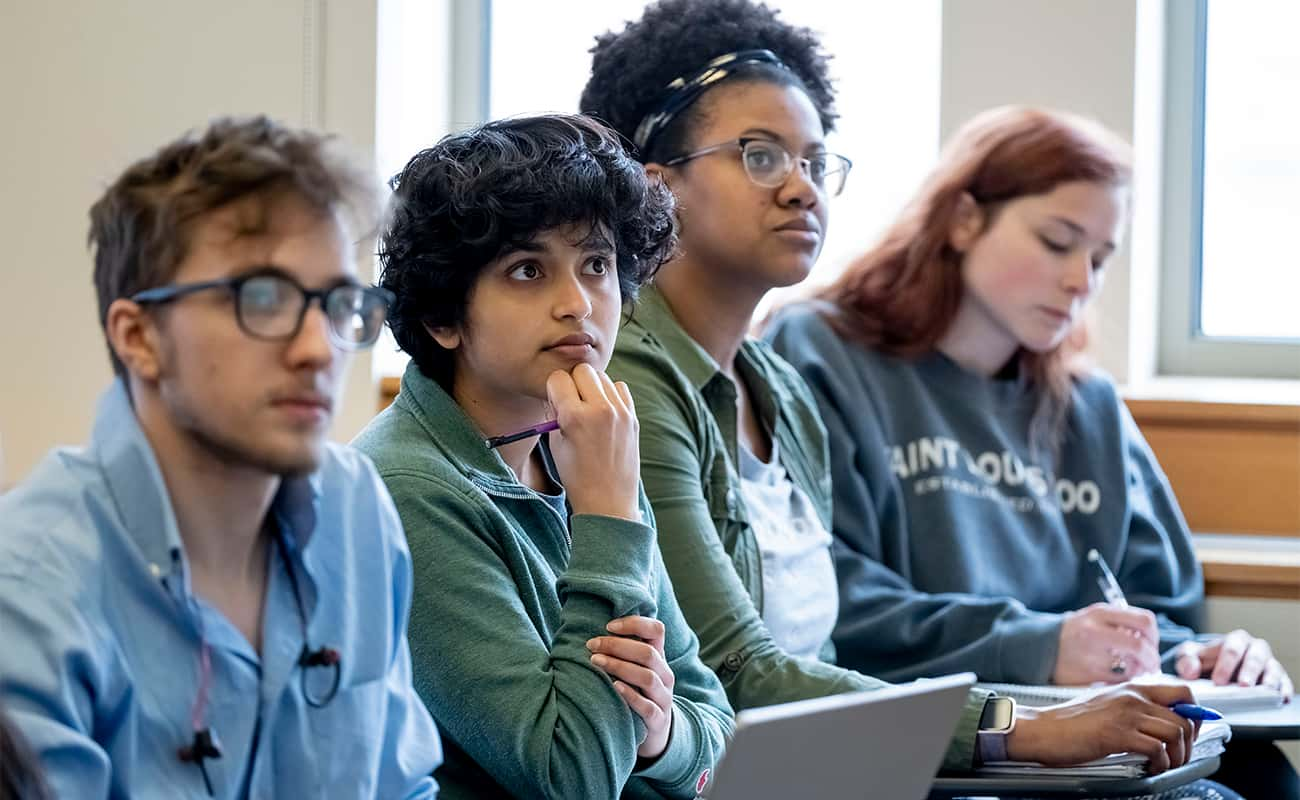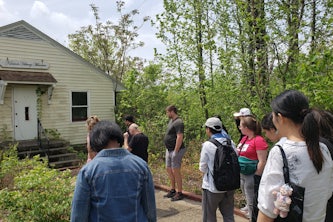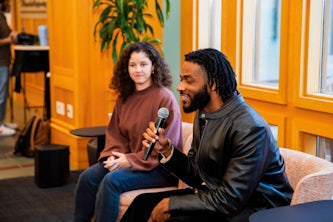It's easy to start your application.
Equity, Diversity & Inclusion
All members of the McKelvey School of Engineering community are valuable contributors to the culture and community at Washington University in St. Louis.
There has been increased dialogue around equity, diversity and inclusion; however, depending on lived experiences, words hold different meanings for different people. It’s not our intention to define these terms for others, but rather to create a shared understanding and common language.
What is equity, diversity and inclusion?
- Equity promotes “justice, impartiality, and fairness within the procedure, processes, and distribution of resources by institutions or systems.” In McKelvey Engineering, our goal is to provide everyone the opportunity to achieve the same level of success regardless of background and privilege.
- Diversity aims to create a community composed of different races, ethnicities, nationalities, abilities, genders, sexual orientations, ages and socioeconomic classes. McKelvey Engineering is making efforts to ensure our community includes members of diverse backgrounds.
- Inclusion will ensure that all are invited to contribute to the development and direction of McKelvey Engineering. A key element of inclusion is the perception of belonging, safety and membership for all.
We are developing new programs, policies and resources, but most importantly, we are listening. By working together, we can enact change.
Engineering Diversity News
Report a bias incident
Report incidents involving students to Mark Kamimura-Jiménez, PhD, at mkamimura@wustl.edu.
Report incidents involving faculty members or staff to Nicole Hudson at hudsonnc@wustl.edu.
University resources
No matter who you are, the McKelvey School of Engineering and WashU have resources available to help empower you in your studies and research.
- The Center for Diversity and Inclusion supports and advocates for undergraduate, graduate and professional students from underrepresented and/or marginalized populations.
- The Ann W. and Spencer T. Olin Chancellor’s Fellowship (OCF) is an elite cohort of outstanding graduate students with diverse backgrounds and from varied disciplines.
- Disabilities Resources is where students with disabilities or suspected disabilities can request accommodations and services.
- The Office for Religious, Spiritual and Ethical Life is an initiative at Washington University to support the diverse religious, spiritual and ethical communities on campus.
- The Office of International Students and Scholars assists international students, postdoctoral fellows and faculty.
- The Office of Military and Veteran Services is Washington University’s focal point for military and veteran matters.
- The TRiO Program Support Services supports the increase of university students who are first in their families to go to college, low-income by federal guidelines, or have a learning or physical disability.
- Physical accessibility resources on campus include accessible parking and classroom access, as well as medical escorts.
- The Office of Institutional Equity was created to serve the university’s primary source for diversity and inclusion resources.
- Anti-Discrimination and Anti-Bias Policies support and protect diversity and inclusion at the university. Find a list of faculty, student and staff policies, as well as general anti-discrimination policies.
- The Office of the Vice Provost for Faculty Affairs and Diversity focuses primarily on faculty diversity and development.
- SafeZones Training for Faculty and Staff offers faculty, graduate teaching assistants and staff inclusivity training to promote safer and more secure living, learning and research environments for WashU’s LGBTQIA* students.
- The Campus Diversity Collaborative (CDC) encourages campus conversation on issues of diversity and inclusion, and fosters a support network for WashU professionals who are passionate about these issues.
- The Preferred Name Policy offers suggestions to faculty on supporting students' use of preferred-name, as well as links to pronunciation guides that may be helpful when learning the names of international students.
- Faculty Information from Disability Resources has prepared information and a model syllabus statement for faculty to assist in supporting disabled students in the classroom.
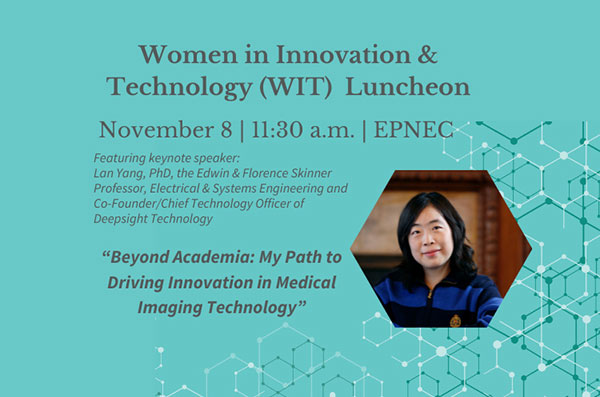
Women in Innovation & Technology
Lan Yang to deliver keynote talk at WIT luncheon
Yang will present "Beyond Academia: My Path to Driving Innovation in Medical Imaging Technology" on Nov. 8 at the Women in Innovation & Technology Luncheon.
Supporting LGBTQ students
McKelvey Engineering celebrates Coming Out Day
The McKelvey School of Engineering celebrated National Coming Out Day on Oct. 11 with sweet treats, photos at the Big Smile Photo Booth and words of encouragement. The event was hosted by the McKelvey Engineering EDI in collaboration with oSTEM.
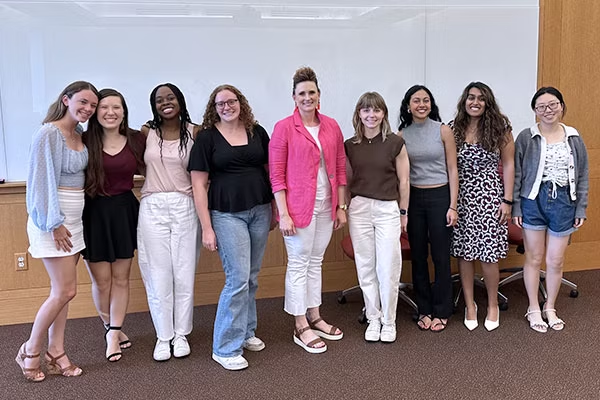
Mentorship
Women & Engineering Center revamps its prestigious mentorship program
The expanded program aims to expand its reach by offering students a bigger variety of mentoring opportunities
Why it's critical to act now
First, it’s the right thing to do.
Second, research has shown innovation, complex problem solving and creativity require a diversity of thought and ideas, which can best be cultivated by the presence of students, faculty and staff of all backgrounds.
If everyone on a team has the same lived experiences and way of thinking, then the approaches and solutions they’d develop would be similar. There is no shortage of talented individuals from different races, ethnicities, nationalities, abilities, genders, sexual orientations, ages and socioeconomic classes. It’s unacceptable to waste this vast and diverse array of talent, and it’s our job as engineering leaders and educators to establish pipelines of access to leverage it.
Moreover, populations who are underrepresented in the engineering field currently make up the majority of kindergarten students in our nation. Without actively establishing pipelines of access and success for diverse cohorts of students through post-graduate education, we have little hope maintaining an innovative, economically competitive and secure future.
Our mission statement
Our school seeks to produce new knowledge that changes the world by promoting independent inquiry in engineering research and education with an emphasis on scientific excellence, innovation and collaboration. We affirm our responsibility to promote equity and diversity as well as to cultivate an inclusive environment. We acknowledge that our school’s mission may only be achieved by leveraging the diversity of our lived experiences and cultures.
Our vision
To cultivate an environment where Equity, Diversity, and Inclusion (EDI) is indispensable to the pursuit of excellence and distinction and that enables our faculty, staff, and students to achieve their full potential with intentional practices that respect the humanity of all.
Share your feedback
The Equity, Diversity & Inclusion Committee is eager to hear from members of the McKelvey Engineering community. Students, faculty and staff are invited to share potential programming ideas, suggestions for future EDI initiatives or feedback about current programs.
This form is NOT to be used to report bias incidents. To report incidents of bias, prejudice or discrimination involving students, complete the Student Conduct Incident Report form. For incidents involving faculty or staff, contact WashU HR, the university's Title IX coordinator and/or the Office of the Ombuds.

